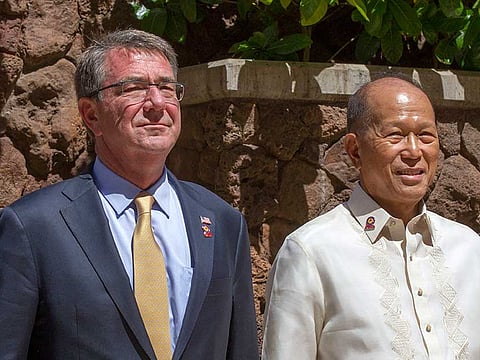Defence ministers see emergence of Daesh-like entity in Southeast Asia
Philippines, Malaysia and Indonesia to mount joint air patrols to guard against common threats

Manila: Defence ministers of the Philippines, Malaysia and Indonesia are considering launching joint air patrols over transit corridors, in a bid to address common security and peace concerns in areas infested by militants.
Meeting in Hawaii for the Association of Southeast Asian Nations (ASEAN)-United States Defence Dialogue last October 1, Philippine Defence Secretary Delfin Lorenzana, and Malaysian and Indonesian Defence Ministers Hishammudin Hussain and Ryamizard Ryacudu, agreed to explore the possibility of mounting joint air patrols in common border areas where pirates and terror groups like the Abu Sayyaf operate.
During the meeting, the ministers of the three Southeast Asian countries agreed to discuss the conduct of joint air patrols, although they are yet to agree on finalising parameters for conducting maritime watches over agreed transit corridors.
According to Lorenzana, the planned sea and air patrols are primarily driven by rising incidents of armed robbery, kidnapping as well as piracy in common border areas.
Last June, the three countries agreed to hold trilateral meetings in the face of kidnappings and hijackings carried out by lawless groups such as the Abu Sayyaf in the area of the Sulu Sea.
During their meeting in Indonesia last September 9, Presidents Joko Widodo of Indonesia and Rodrigo Duterte of the Philippines discussed ways of strengthening cooperation including maritime security and law enforcement.
“We agreed to step up joint measures to address the issue of piracy and lawlessness in the waters in our region,” Duterte said at that time.
There had been a noticeable increase in piracy attacks and kidnap-for-ransom carried out by lawless groups in the Sulu Sea area in recent months.
On Sunday, the Abu Sayyaf released three kidnap victims they snatched from a tugboat and barge transiting the Sulu Sea from Indonesia to Davao.
The release of the Indonesians brought to 16 the number of kidnap victims released or rescued from the Abu Sayyaf since July.
According to Lorenzana, aside from being a platform to address common concerns such as piracy, kidnap-for-ransom and robbery, an emerging concern among the three countries is violent extremism.
“The phenomenon of returning fighters from the conflict in the Middle East could eventually create security challenges for the three countries, something which the ministers recognised and hence their decision to further get their act together,” said Lorenzana.
“With the political support of their respective political leaders, Presidents Rodrigo Duterte and Jokowi Widodo and Prime Minister Najeeb Razzak, the three ministers are confident that the apparent intent of Daesh-affiliated groups in their respective countries to establish a caliphate in Southeast Asia, similar to what the extremist movement intends to put up in the Middle East, would not become a possibility,” he said.
Sign up for the Daily Briefing
Get the latest news and updates straight to your inbox



